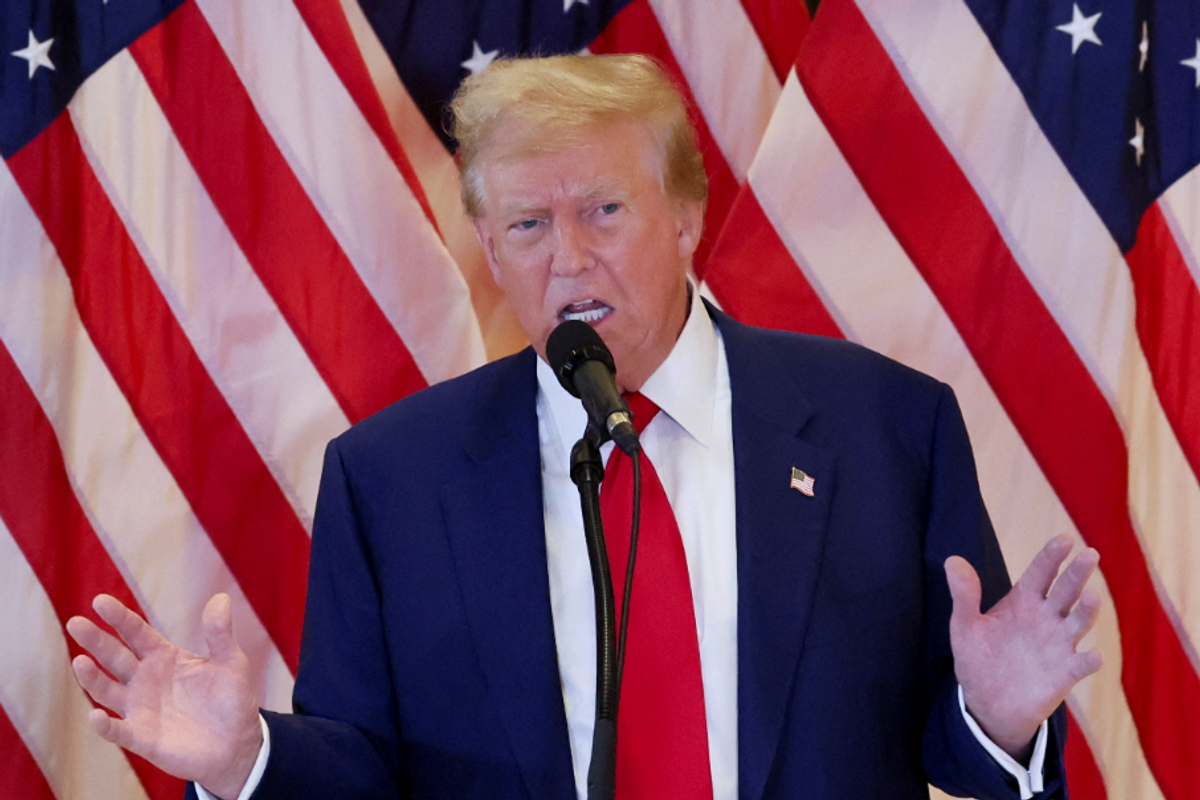
Former President Donald Trump delivers post-conviction remarks on May 31, 2024
"I am a political prisoner," declared former President Donald Trump the day after his 34-count felony conviction.
If we were to take that remark seriously, it would quickly become obvious that Trump is not, in fact, a political prisoner but merely a remorseless criminal. Unlike actual political prisoners, who never hesitate to take the witness stand in their own defense, Trump made the cowardly decision to avoid testifying, despite his blustering promises to do so.
"Yeah, I would testify, absolutely," he said just before the trial began in New York's Supreme Court. "I'm testifying. I tell the truth, I mean, all I can do is tell the truth."
That claim of candor evaporated post-verdict, when Trump tried to explain why he had chickened out. He vaguely blamed "rulings" by Judge Juan Merchan. He said the prosecution could bring up "anything" from his "great past." He said there was no reason to testify because "they had no case." He said to testify would risk a perjury indictment, an excuse that sounds odd from a man who insists he can only tell the truth.
If Trump were any kind of political prisoner, he would have leapt at the opportunity to speak on his own behalf and to advocate his cause, in the fearless tradition followed by history's legendary political defendants.
When John Brown was on trial for his life after the 1859 raid on Harpers Ferry, he served not only as a witness but as his own counsel. The militant abolitionist repeatedly spoke in court, at great length, to excoriate slavery, explain the violence he had perpetrated and denounce the "mockery of a trial" that concluded with his death sentence. Nobody can say he didn't make his point.
Nearly a century later, Fidel Castro, also appearing as his own counsel, delivered a four-hour defense summation in court which was sufficiently compelling to be published as a book titled History Will Absolve Me. Although history will condemn the late Castro for turning away from agrarian reform and democracy to Communist oppression, at least he had the guts to address the court that sent him to prison. (He had led a raid on an army fort to seize weapons, rather than paying off an adult film star for a sexual encounter, so his argument possessed a certain dignity that Trump's lacks.)
Then in 1963, when South Africa's apartheid government put Nelson Mandela and several of his comrades on trial for their lives, the great democratic revolutionary delivered an eloquent address in the dock that held his listeners spellbound for four hours. Titled "I Am Prepared to Die," as he declared to the court, it laid out in irrefutable detail Mandela's contention that the South African justice system and the country's entire governmental structure were illegitimate — and his promise to replace it with equal representation for all, a crusade in which he was ready to sacrifice his life.
By contrast, whenever Trump squawks about being a "political prisoner" and decries the authority of a duly constituted court, he sounds like the self-aggrandizing buffoon that he always has been. He had the best counsel that his dumb donors could buy, and those lawyers evidently persuaded him that his long trail of lies, both under oath and in public, would prove ruinous if he dared to take the stand.
Rather than an authoritarian tribunal, Trump faced a jury of his peers, all chosen with the consent of his attorneys, a dozen New Yorkers who faced down his daily abuse as well as the threats of his MAGA goons. The jurors' courage and Trump's bullying call to mind the kind of defendant he truly resembles, a mob boss like Al Capone or John Gotti.
The convicted Trump will have every opportunity to appeal, perhaps all the way to the Supreme Court, where he expects the justices he appointed to rule in his favor, and where two disreputable jurists who should recuse will nevertheless hear his case. But whatever they do, the stain is indelible.
Let us hope that come Election Day, Americans will follow Trump's advice in 2016 concerning presidential candidates under indictment. Back then, he believed Hillary Clinton would soon face trial on bogus charges of mishandling classified documents (the same offense for which he should now be on trial, except for the intervention of another unscrupulous judge).
"She shouldn't be allowed to run," Trump said of Hillary. "If she wins, it would create an unprecedented constitutional crisis. In that situation, we could very well have a sitting president under felony indictment and, ultimately, a criminal trial. It would grind government to a halt."
How much more true for a would-be president already stamped "guilty" 34 times.
Reprinted with permission from Creators Syndicate
Joe Conason is founder and editor-in-chief of The National Memo.He is also editor-at-large of Type Investigations, a nonprofit investigative reporting newsroom formerly known as The Investigative Fund, and a senior fellow at Type Media Center. His forthcoming book, The Longest Con: How Grifters, Swindlers and Frauds Hijacked American Conservatism, will be published by St. Martin's Press in July.
- What Fox Analyst Turley Gets Wrong About Trump (Nearly Everything) ›
- Special Counsel May Indict Trump Under Reconstruction Era Anti-Klan Statute ›
- Democracy Upheld, Autocracy Rejected In Judge Chutkan's Blast At Trump ›
- 'Deny, Deny, Deny' Is No Longer Working So Well For Donald Trump ›
- Stephen Miller's Latest Loony Claims Of Trump's Immunity From Prosecution ›
- On Trial For Campaign Crimes, Trump Brazenly Solicits A Very Big Bribe ›
- Does Trump Belong In Prison -- Or A Mental Institution? - National Memo ›








